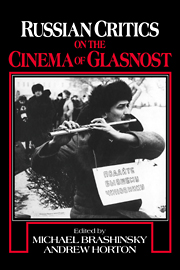Conclusion
Published online by Cambridge University Press: 04 August 2010
Summary
Death of the word
Before speculating on the end of Soviet cinema, we should kiss goodbye anything “Soviet.” The word has lost its meaning in all things, not just in geographic imperialism and political status. From the map, the word has traveled straight into history textbooks.
What then shall we call the movies made on the territory of the former Soviet Union? It is much easier to call the territory “Russia” than the films made on it “Russian,” because the national aesthetic tradition is long gone. Nothing but myth is left of it. The problem is being solved rather trivially today: Bad films are known as “cooperative” films, mediocre films as “glasnost” films, and good ones as simply “films.”
Absence of location
One could not find a location for shooting in today's Russia: The country has just been exhausted. All that is left on display perches on the edge of emergency: St. Petersburg, a few forests, a couple of fields and rivers. But it would be next to impossible to clean them up enough to create pleasant locations. They are suitable for nothing but condemnation and criticism, with which both viewers and film makers, even the most daring in the recent past, have become bored.
Although everything old has crumbled, there is neither time nor money to build anew. The film necessities – nails and sets, paints and makeup, bulbs and lights, fabrics and costumes, let alone camera and sound equipment – have performed a universal vanishing act.
- Type
- Chapter
- Information
- Russian Critics on the Cinema of Glasnost , pp. 141 - 146Publisher: Cambridge University PressPrint publication year: 1994

